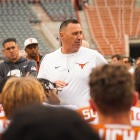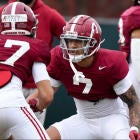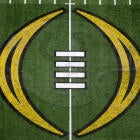DESTIN, Fla. -- SEC commissioner Greg Sankey distanced himself on Friday from Mississippi State's decision to enroll five-star recruit Jeffery Simmons, saying he was not comfortable with the decision, but it's up to the university.
On Thursday, Mississippi State announced it was enrolling Simmons and suspending him one game due to his arrest for repeatedly hitting a woman on the ground in an incident caught on video. Mississippi State athletic director Scott Stricklin had said the SEC was "comfortable with the decision."
"It's interesting to hear that and read that and to be asked that question because I'm quite protective of that communication," Sankey said on the final day of the SEC spring meetings. "I saw a word 'comfortable.' I would not express comfort with a situation like that. It is difficult. We as a conference are wrestling with these issues, and obviously in a public way. Certainly no one in the commissioner's office, my office, would communicate comfort with that situation. Yet, the reality is those institutional decisions are still left at that level."
Added Sankey later: "Awareness and comfort are two different things. It is a difficult circumstance."
Through a team spokesman, Stricklin declined to comment. This is the second time in two days a high-ranking official within the SEC has distanced himself from Mississippi State's decision. On Thursday, Mississippi State president Mark Keenum repeatedly said he completely trusts Stricklin and referred to his athletic director's comments without offering his own opinion.
ESPN.com's Chris Low tweeted a quote Friday from Mississippi State coach Dan Mullen about Simmons that said, "As we looked at the details ... beyond just the part of the video in the media, we felt he deserved a chance in life."
The SEC on Friday approved expanding its rule banning transfers who have been involved in serious misconduct. Under the new definition, transfers are banned from the SEC if they have been convicted or pled guilty or no contest to a felony involving serious misconduct or have been subject to official university or athletic department discipline due to serious misconduct.
Previously, the SEC defined serious misconduct as "sexual assault, domestic violence or other forms of sexual violence." The new definition includes that definition and adds "dating violence or stalking; or conduct of a nature that creates serious concerns about the safety of others." Simmons' case doesn't fit into the SEC's rule because he is a recruit.
"I think what you see right now relative to the circumstances at Mississippi State is that young man will be under more scrutiny than any other student on that campus, and the hope is he fulfills the expectations now placed upon him," Sankey said.
Sankey said the SEC will continue to discuss possibly expanding the rule to include recruits and couldn't predict if that would happen.
"We have had those kinds of conversations with attorneys, and that's part of the broader difficulty," Sankey said. "There's an assumption now, it seems, you just flip a switch and we can take care of it at the conference level. Well, that may not be the case. In fact, there may be challenges at the institution level in certain matters. There may be a challenge out there on accessing full and complete information whether they're enrolled in college or not. We've clearly established an expectation for a best effort as it relates to transfers because the sense, the learning, the analysis is that's a place where we can access the kind of information to make informed decisions."
South Carolina president Harris Pastides, the outgoing chairman of the NCAA Division I Board of Directors, said he advised his athletic director to be "extraordinarily sensitive" about athletes who act violently toward women.
"I really don't know enough about (Mississippi State's decision) other than it happened to be able to say it was right or wrong," Pastides said.
In other SEC news from the last day of meetings:
- The SEC baseball tournament will remain in Hoover, Alabama, where the event has been staged for 19 straight years. Sankey cited Hoover's plan to build a $70 million campus around the stadium as setting it apart from the bids from New Orleans, Jacksonville, Memphis and Nashville. The facility plans to have six practice fields adjacent to the stadium.
- The SEC will purchase conference-wide insurance to protect against football game revenue losses that may occur from the cancellation or postponement of games. In the past two years, games involving Florida-Idaho, LSU-McNeese State and South Carolina-LSU have been cancelled or moved due to weather.
- Fans at football stadiums will now be able to see video feed from the replay booth on the video board during official reviews. Previously, only the television network feed could be used on stadium video boards.
- The SEC is no longer announcing its revenue distribution at the spring meetings because the conference's amount is not determined until the end of its fiscal year. The SEC said revenue distribution will be released publicly after the league's approval of its revenues and expenses in October.






















